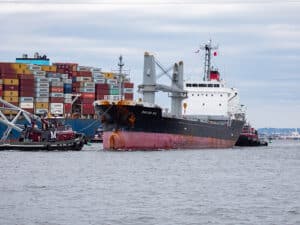
Cargill: Six months trial of WindWings produces predicted fuel savings
Written by Nick Blenkey
Cargill-chartered Pyxis Ocean seen in the English Channel earlier this month, [Photo: Cargill]
In its first six months in operation with wind assisted propulsion, the Cargill-chartered bulker Pyxis Ocean has achieved performance consistent with what was predicted, which is equivalent to an average of 3 tonnes of fuel per day.
Owned by Mitsubishi Corporation subsidiary MC Shipping, the 2017-built, 80,962 dwt bulker became the first ship to be fitted with BAR Technologies’ WindWings when it was retrofitted with two of the hard sails at a COSCO shipyard in China in August last year.
We are encouraged by the results and have learned a great deal about implementing wind assisted propulsion on dry bulk vessels,” said Jan Dieleman, president of Cargill’s Ocean Transportation business. “We could never have done this alone – BAR Technologies and MC Shipping and have been fantastic partners in making the Pyxis Ocean a reality as well as the captain and crew. We are on the leading edge of change in the shipping industry and believe technologies that harness the wind could be an important, cost-effective way to achieve our decarbonization goals in the short, medium and long-term.”
During its first six months of testing with the WindWings, Pyxis Ocean has sailed the Indian Ocean, Pacific Ocean, North and South Atlantic, and passed Cape Horn and the Cape of Good Hope. The two 37.5-meter high WindWings are installed vertically to catch the wind and propel the ship forward, allowing the ship’s engine to be turned down so that the ship can travel at the same speed as a conventional ship using less fuel.
The wings are controlled by a touch panel on the bridge. A simple traffic light system tells the crew when to raise or lower the sails. Once raised, the operation is fully automated: sensors onboard constantly measure the wind, and the sails self-adjust to the optimal configuration.
The results of the Pyxis Ocean’s first voyage with WindWings installed clearly demonstrate that wind assisted propulsion can secure significant fuel savings and emissions reduction,” said BAR Technologies CEO John Cooper. “For example, in near optimum sailing conditions, during an open sea voyage, the Pyxis Ocean achieved fuel savings of 11 tonnes per day. And while the Pyxis Ocean has two WindWings we anticipate the majority of Kamsarmax vessels will carry three wings, further increasing the fuel savings and emissions reductions by a factor of 1.5. With Cargill we are now able to validate our performance predictions and modeling in real-world conditions, it’s an exciting time as we begin to roll out WindWings production globally.”
“Cargill is creating ways for all WAP vessels – not just the Pyxis Ocean – to operate on global trade routes,” said Dieleman. “So far, we’ve engaged with more than 250 ports to find ways of enabling vessel with large scale WAP to berth. This complexity is where Cargill truly excels, and how we can leverage our unique role in the maritime industry. We are not afraid to be a development partner and invest, share risks with partners, and to make a difference in transforming the industry.”
Cargill says that it will continue the testing and experimenting of operational, technical and commercial aspects of the Pyxis Ocean to incorporate the maximum amount of learning into potential design of future installations before scaling up.
- BAR Technolgies and Cargill estimate an annual average savings of 3 tonnes of fuel reductions per day (this equates to 11.2 tonnes/day CO2e well-to-wake emissions reductions. This equates to roughly 14% savings on Pyxis Ocean.
- Average performance measured so far is within 10% of predictions made using computational fluid dynamics (CFD) simulations by BAR Technologies to estimate how well wind assisted propulsion would work on Cargill routes.
- During optimal sailing conditions, the Pyxis Ocean achieved savings of more than 11 tonnes/day in fuel consumption, which translates to 41 tonnes/day less CO2e emitted well-to-wake, or a 37% emissions savings.
- The 11.2 tonnes/day CO2e average above works out to be about 2,650 CO2 e/yr (11.2 tonnes x 237 average sailing days per year = 2,650 tonnes well-to-wake). This would be the equivalent of removing 480 cars off the road. (Reference: Greenhouse Gas Emissions from a Typical Passenger Vehicle | US EPA)
- Cargill and MC Shipping have engaged DNV as an independent third party to review and verify the fuel savings calculations.




